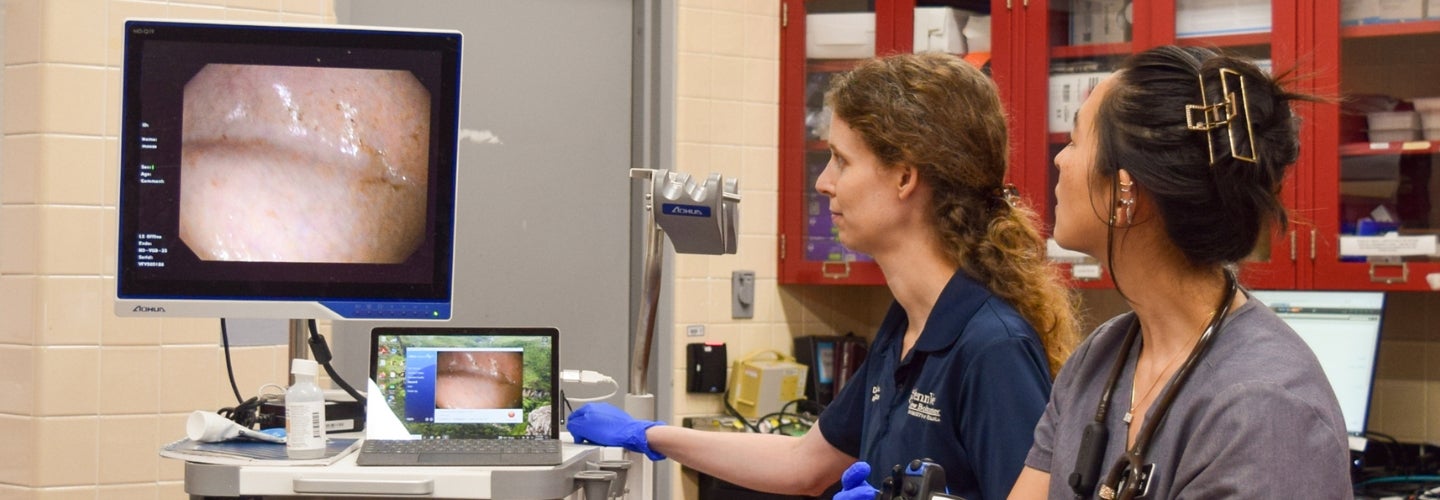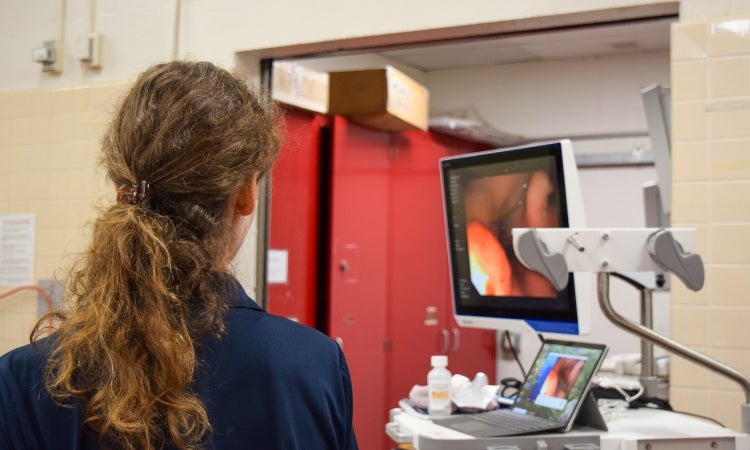
Internal Medicine
What we do
The Internal Medicine Service at New Bolton Center is comprised of internationally recognized specialists within their field. Large Animal Internal Medicine is a specialized area of veterinary care that encompasses expertise across numerous medical disciplines, including neurology, oncology, endocrinology, pulmonology, and neonatology, among others.
Our Services
Areas of Expertise

Our internal medicine specialists bring advanced experience in diagnosing and managing complex and uncommon cases. Our faculty and residents also actively engage in clinical research, continually enhancing our understanding and improving the health and care of our patients.
Pituitary Pars Intermedia Dysfunction (Equine Cushing’s Disease) and Equine Metabolic Syndrome are two very common endocrine disorders of horses. These disorders can lead to serious complications, most notably laminitis. Our internal medicine specialists possess expertise in the management of endocrine disorders and laminitis. Dr. Van Eps provides weekly in-person consultation service, focused on advanced diagnostics for problem equine endocrine cases.
To learn more about endocrine disorders in horses, watch Dr. Van Eps’ First Tuesday Lecture “Overcoming Laminitis through Better Insulin Control.”
New Bolton Center offers the latest in diagnostic options for gastrointestinal disorders, including gastroscopy, ultrasound, biopsy, and intestinal absorption studies.
Liver disease in horses can be serious, but early diagnosis and expert care make a big difference. Our team specializes in identifying and treating liver conditions, offering advanced testing and personalized treatment plans. Dr. Tomlinson is world-renowned for her expertise in equine liver viruses and liver diseases.
To learn more about liver diseases in horses, check out this recent TheHorse.com article.
New Bolton Center’s Neonatal Intensive Care Unit is world-renowned for its management of critically ill neonates, as well as management of high risk pregnancies. Dr. Abraham leads our NICU team each year, bringing over 2 decades of neonate experience.
We are one of the few veterinary hospitals in the US with a dedicated large animal neurologist. One of five double-boarded large animal neurologists in the country, Dr. Johnson is world-renowned for her expertise in neurologic disease, including neurodegenerative conditions (eNAD/EDM), neck problems, EPM, and Lyme neuroborreliosis.
Our internal medicine team possesses expertise in the diagnosis and management of a wide range of tumors in large animals, offering compassionate, cutting-edge care every step of the way. Dr. Luethy has a particular interest in oncology and the diagnosis and treatment of lymphoma.
Urinary and kidney disease can be life-threatening. Our specialists are experienced in diagnosing and managing these disorders, through advanced diagnostics including ultrasound, biopsy, and cystoscopy.
Our specialists diagnose and treat respiratory disorders such as equine asthma and pneumonia. Dr. Nolen-Walston has decades of experience in the management of equine respiratory diseases, with a particular interest in equine asthma.
To learn more about respiratory disorders in horses, watch Dr. Luethy’s First Tuesday Lecture “Decoding the Coughing Horse.”
Board-certified dermatologists are available by appointment (typically once-monthly) to consult on animals with skin problems.
Our Care Team

Section Chief, Internal Medicine & Ophthalmology
Amy L. Johnson, DVM, DACVIM (LAIM & Neurology)
Professor of Medicine and Neurology; Marilyn M. Simpson Professor of Equine Medicine (CE)
Clinicians
Residents, Interns, and Fellow

Jessica Cathcart, DVM

Anthony Cervone, DVM

Kayla Even, VMD

Arturo Fernández, DVM

Samuel Gonzalez, DVM

Leci Irvin, DVM

Loretta Lacy, DVM

Virginia Logue, DVM

Erin McCready, DVM

Kaylee Montney, DVM

Hannah Quail, DVM

Kali Slavik, DVM, DACVIM

Bryana Smith, DVM

Hannah Taylor, VMD
Research in Medicine
New Bolton Center’s Internal Medicine faculty are actively engaged in innovative research.
van Eps Laminitis Laboratory
The van Eps Laminitis and Endocrinology Laboratory at New Bolton Center is focused on understanding the key events that drive laminitis under different circumstances in order to develop reliable means of prevention and treatment.








